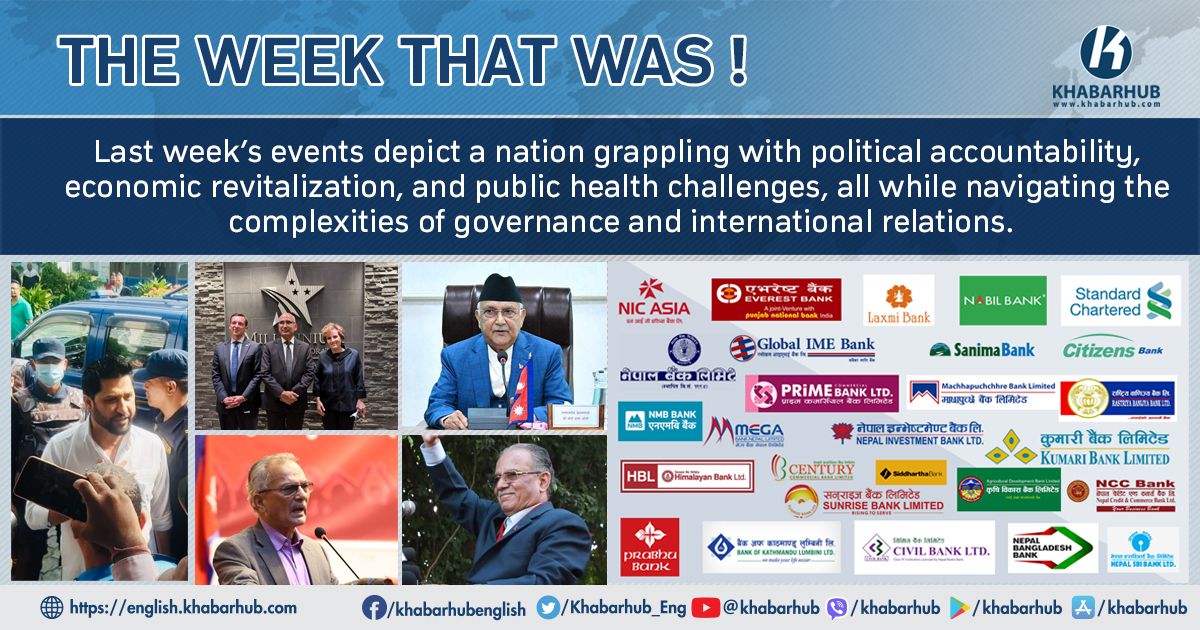KATHMANDU: Last week in Nepal was marked by significant political and economic developments, reflecting ongoing tensions and shifts in various sectors.
The Kaski District Court’s decision to remand Rastriya Swatantra Party (RSP) Chair Rabi Lamichhane for an additional seven days underscores the gravity of the allegations he faces, particularly concerning cooperative fraud and organized crime.
This case has not only caught public attention but also highlights broader issues of corruption within political and financial systems in Nepal.
Lamichhane’s arrest and the subsequent court proceedings indicate a tightening of legal scrutiny over political figures, which may resonate with the public’s demand for accountability.
Meanwhile, the vigil organized by the main opposition –Maoist Center –in Kathmandu on Saturday spotlighted the deepening discontent with the ruling coalition led by CPN-UML and the Nepali Congress (NC).
Spearheaded by Maoist Chairman Pushpa Kamal Dahal “Prachanda”, the assembly served as a platform for the Maoists to not only express their grievances about rampant corruption and ineffective governance but also to lay the groundwork for potential political mobilization.
As Prachanda warned the government, “if the behavior does not improve, we will drag them to the streets,” it’s evident that the Maoists are gearing up for a more confrontational stance.
Meanwhile, the Nepal Samajwadi Party, led by Dr. Baburam Bhattarai, held a statute convention where it announced plans for a rebranding as Naya Shakti.
This strategic move aims to rejuvenate the party’s image and perhaps attract new supporters ahead of the general convention scheduled for February.
Overall, last week’s events depict a nation grappling with political accountability, economic revitalization, and public health challenges, all while navigating the complexities of governance and international relations.
It reflects an ongoing effort among political groups in Nepal to adapt to changing political landscapes and to address internal dynamics.
On the financial front, the Central Investigation Bureau’s recommendation for red notices against individuals linked to the Miteri Cooperative fraud case raises concerns about the integrity of cooperative institutions in Nepal.
The investigation into the embezzlement of significant funds (Rs 148.1 million) not only highlights the need for stricter regulatory oversight but also suggests potential political entanglements, especially considering the personal connections to influential political figures.
Meanwhile, in a bid to bolster economic growth, Prime Minister KP Sharma Oli announced a commitment of Rs 34 billion in investments for 200 enterprises.
His address reflects an optimistic outlook on Nepal’s economic recovery, emphasizing the government’s proactive approach to revitalize the economy.
This investment is expected to create jobs and stimulate activity, although skepticism about the effectiveness of such measures remains prevalent among citizens.
Additionally, the commercial banking sector reported a robust 21.63% increase in net profits in the first quarter, signaling resilience amid economic challenges.
However, disparities among individual banks raise questions about the sustainability of growth in the sector and its implications for the broader economy.
Additionally, PM Oli’s call to action against dengue reflects a growing public health concern.
His appeal for collective mobilization highlights the importance of community involvement in tackling health crises.
This initiative could foster greater public awareness and cooperation in addressing health challenges.
Similarly, discussions between Finance Minister Bishnu Prasad Poudel and international finance leaders in Washington DC signal Nepal’s ongoing efforts to strengthen international partnerships and secure technical assistance for economic development.
This outreach is crucial for enhancing Nepal’s position in the global economic landscape and ensuring the successful implementation of significant projects.
Overall, last week’s events depict a nation grappling with political accountability, economic revitalization, and public health challenges, all while navigating the complexities of governance and international relations.









Comment